Link
Minor tw for food mention in the article.
16 notes
·
View notes
Text
rich people:
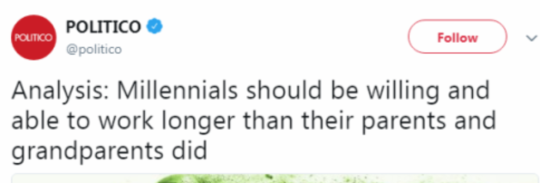
millennials:

216K notes
·
View notes
Video
Now that Avatar is on Netflix in the US I get to enjoy all these gags again surrounding Toph’s blindness. It honestly impressed me how it was seriously humorous they were able to make these punchlines without it feeling jarring or downright off putting basing humor around someone’s visual disability.
However, they pulled it off so amazingly well. Looking forward to taking a trip down memory lane.
52K notes
·
View notes
Text
People will accept eugenics so long as it proves them valid in some way. Like “if scientists prove there’s a gay/trans gene or something we’ll finally be recognized as legitimate by all” like nah dude that’s fucking eugenics bud that’d be used to get rid of us
Or mom’s being like “I can’t wait till one day when we can find the autism gene and stop autism once and for all” like bitch that’s eugenics is your kid having a sensitivity to touch and not wanting to be hugged such a big deal to you that you want to get rid of all autistic people? That’s so incredibly selfish and terrible.
Eugenics isn’t a morally gray area. It’s all bad. All of it. “We can stop families from suffering :(” suffering what? A unique individual? Fuck off.
51K notes
·
View notes
Text
You're definitely one of the coolest people in the fight and I admire you a lot!
The chronic pain community has a problem.
The problem is how we talk about opioid addiction. I admit I'm guilty of it too! I'll gladly whip out the statistics of how relatively few long-term chronic pain patients have Opioid Use Disorders. I'll talk about the dangers of forced tapering, and the fact that restricting access to safe pain medication actually increases the rate of accidental overdoses, as pain patients are forced to seek more illicit methods of pain relief (@lifewithchronicpain has tons of resources and data about this). But there's something I don't talk as much about, and I should.
The thing we need to talk more about is that some of our fellow sufferers do have OUDs, but they still deserve fair and compassionate medical treatment. We get so caught up in convincing our doctors that we're "responsible" or "legitimate" pain patients that we don't realize the implications of our words - we're saying that people who struggle with dependence and addiction are somehow less responsible, less legitimately in need of pain medication, even if they're hurting just as much as we are.
And that's not acceptable. We don't get to rail against doctors gatekeeping our pain and then turn around and do it to others.
Am I saying we should be indiscriminately prescribing opioids to patients with OUDs? No, because just like us, each pain patient with OUDs has unique needs and goals. Some issues have more permanent solutions, like surgery, which are often more preferable for both patient and doctor alike.
But if we want to be able to say to our doctors, "I know the risks involved with opioid treatment, but I want to exercise my right to informed consent" then we need to advocate for the right for everyone to do so.
Many OUD patients don't want to ever take anything stronger than ibuprofen because the risk of relapse. We should support that! But we should also support the people who have weighed the quality of life with monitored opioid administration, vs the quality of life with untreated chronic pain, and realized that the medication is a risk worth taking.
Opioid use disorders do not negate a patient's rights or needs or pain. Let's all make a conscious change and stop throwing them under the bus.
204 notes
·
View notes
Text
The chronic pain community has a problem.
The problem is how we talk about opioid addiction. I admit I'm guilty of it too! I'll gladly whip out the statistics of how relatively few long-term chronic pain patients have Opioid Use Disorders. I'll talk about the dangers of forced tapering, and the fact that restricting access to safe pain medication actually increases the rate of accidental overdoses, as pain patients are forced to seek more illicit methods of pain relief (@lifewithchronicpain has tons of resources and data about this). But there's something I don't talk as much about, and I should.
The thing we need to talk more about is that some of our fellow sufferers do have OUDs, but they still deserve fair and compassionate medical treatment. We get so caught up in convincing our doctors that we're "responsible" or "legitimate" pain patients that we don't realize the implications of our words - we're saying that people who struggle with dependence and addiction are somehow less responsible, less legitimately in need of pain medication, even if they're hurting just as much as we are.
And that's not acceptable. We don't get to rail against doctors gatekeeping our pain and then turn around and do it to others.
Am I saying we should be indiscriminately prescribing opioids to patients with OUDs? No, because just like us, each pain patient with OUDs has unique needs and goals. Some issues have more permanent solutions, like surgery, which are often more preferable for both patient and doctor alike.
But if we want to be able to say to our doctors, "I know the risks involved with opioid treatment, but I want to exercise my right to informed consent" then we need to advocate for the right for everyone to do so.
Many OUD patients don't want to ever take anything stronger than ibuprofen because the risk of relapse. We should support that! But we should also support the people who have weighed the quality of life with monitored opioid administration, vs the quality of life with untreated chronic pain, and realized that the medication is a risk worth taking.
Opioid use disorders do not negate a patient's rights or needs or pain. Let's all make a conscious change and stop throwing them under the bus.
204 notes
·
View notes
Text
I hate this mentality that old age is a disability on its own
As if you turn 70 and suddenly all of your joints fall apart.
Today is Sunday. This past Wednesday my mother and I drove our 92 year-old spitfire of a cousin in-law a few hours round trip. The older woman walks well, has good mobility, has a little chronic pain in her neck from a car accident ten years ago but is otherwise incredibly healthy. Sharp as a damn tack, too.
My mother has been incapacitated from back spasms since Wednesday from sitting in the car for those hours.
Back in high school, on the train returning from a field trip to San Francisco, where we had walked multiple city blocks, I found myself seated in the row of seats near the entrance. “Federal law requires these seats be made available to the disabled, the pregnant, and the elderly.” I am disabled. I see no issue.
Across from me, in the other row of accessible seats, sit a couple of young men. I don’t know their stories, but I know that outwardly, they appear strong and healthy.
A few stops later a woman storms over to me with rage in her eyes, brandishing some sort of card (perhaps a senior rate clipper card? I’m unsure). She gets in my face, yelling how these seats are for seniors, and she’s a senior, and I need to get up. Now, this woman hardly looked a day over 55, but that’s not my business either. Flustered and unable to form a response, I stand up and give her my seat.
I am too short to reach the vinyl loops for passengers to hold. My knees are too wobbly for me to stay balanced, and my flat feet are burning.
One of the young men from earlier sees this, and insists I take his seat.
To this day I don’t know why that woman assumed that of all of us, I needed the seat least. I can only assume it was because I was the youngest.
Any time I mention back pain or joint problems, someone invariably asks, with a smirk, whether I’m too young for such things, or says almost proudly, “you think this is bad now, just wait until you’re my age.”
My disabled friends have been lectured for using scooters in grocery stores. How dare they, a young person, take the device from the more needy old people? The accoster may even take the time to gesture to a nearby elderly person, who is inevitably more spry and well than the disabled person being accosted (after all, there’s a reason that elderly person isn’t also using one of the scooters).
Airline staff have refused to help me place my luggage in the overhead compartment, even with a doctor’s note. They aid the elderly without being asked. A tall man always volunteers to help me, wondering why nobody else had. I never bother to mention my back.
For many people, age brings added pain and immobility. And those people need ready access to accommodations. But there is no magic switch that gets thrown the second you turn 65 that suddenly allows you to have back pain or need a wheelchair or walker.
My L3 vertebra doesn’t move. My trapezius is permanently taut due to kyphosis and prone to pinching my nerve. My hips are clicky and my knees lock up.
I have flat feet.
I know it’s going to worsen with age. But I am already in pain. I already cannot stand for long periods of time. I cannot sit on stools because I can’t hold up my own back.
This social requirement that I be old before I am recognized as disabled may well prevent me from reaching old age at all.
126 notes
·
View notes
Text


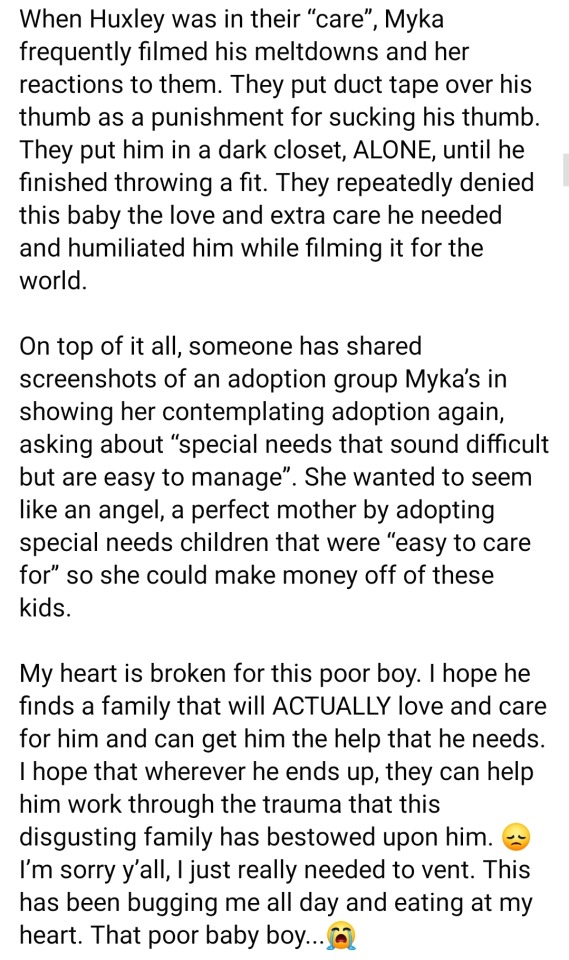
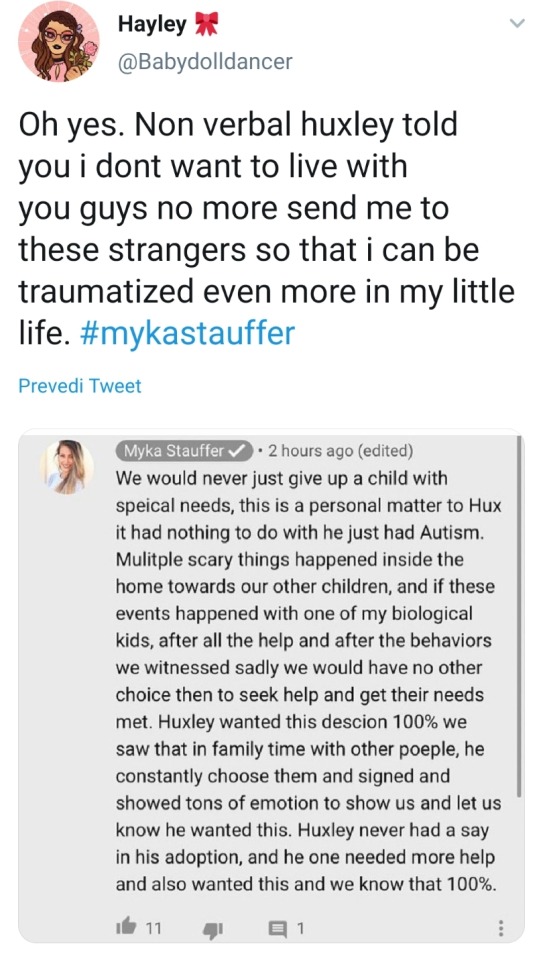
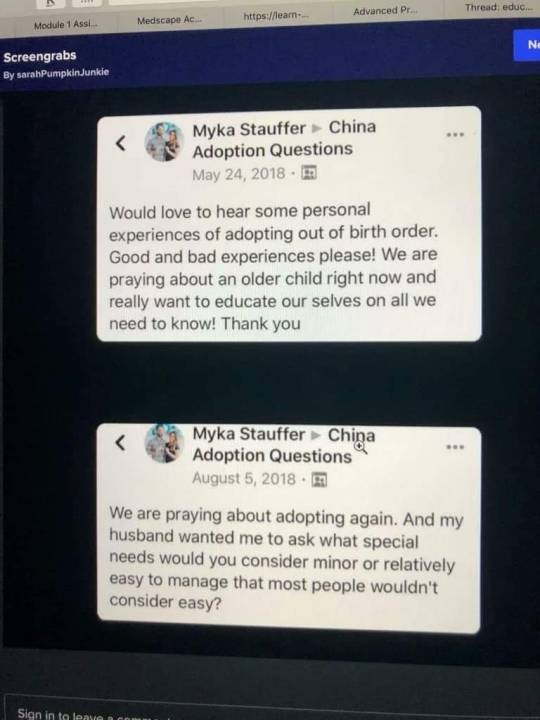


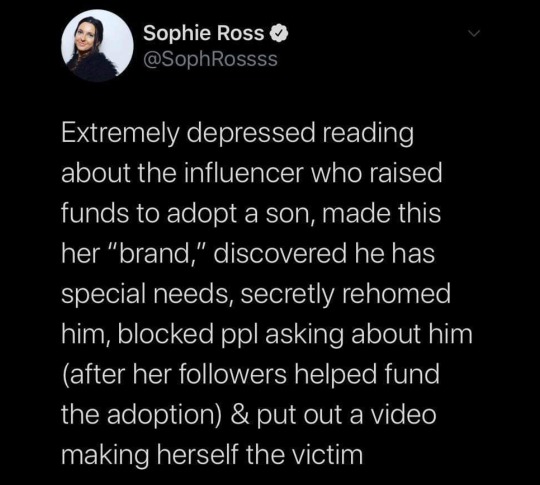


A person like this... should not have a platform, nor sponsors or followers.
I am enraged and feeling deeply hurt for Huxley. I want to know where he is right now, who with and how he's doing.
The shock and stress of this whole situation for him, that poor baby boy. He didn't deserve this.
32K notes
·
View notes
Text
Exactly
I just realized
You know how abled people are super obsessed with sniffing out "fake" people using mobility aids?
Not only does it obviously harm disabled people but like
There's literally no point to it
It's not like canes and wheelchairs are a limited resource
If someone who doesn't "need" a wheelchair wants to shell out money for one and use it? That's fine! It literally doesn't hurt anybody!
Like the argument could be made for public utilities like shopping scooters, but in reality that just illustrates that we don't have enough of them available
There should be enough of them that if an abled person ran a marathon and is really tired, they can use one without it impacting anybody
Which just leads us to a point we already knew: the myth of the "fake disabled person" has always been a justification for providing inadequate aid and accommodations.
8K notes
·
View notes
Text
Those crutches sound awesome, can we see a pic?
Ableds are so attached to their definition of disability as “for the old and feeble” that they can’t change it even when they meet young/competent disabled people.
15K notes
·
View notes
Text
Ableds are so attached to their definition of disability as “for the old and feeble” that they can’t change it even when they meet young/competent disabled people.
15K notes
·
View notes
Text
Teachers are like "Disability accommodations? Never heard of 'em."
14K notes
·
View notes
Text
Disabled person: “I got a new wheelchair! Woot!”
Another disabled person: “YASS! Freedom!!!”
Abled person: “That just makes me so sad.”
20K notes
·
View notes
Text
Hey uh
Any genetic studies regarding autism? That’s eugenics. The endgame is 100% eugenics. Don’t support this.
28 notes
·
View notes
Text
If you hear a story about a disabled person and your takeaway even remotely resembles “I am so grateful and blessed to not be like this person”
Then guess what? You’re ableist, and part of the problem.
12 notes
·
View notes
Text
I sometimes wonder how much of autistic people “taking things literally” is actually us sort of... defaulting because while we technically understand the meaning, we’re not sure how we’re supposed to respond and responding literally is generally mostly harmless.
I know that doesn’t make much sense as worded so I have an example to present:
I used to always answer “what’s up” with “the ceiling/sky”. I knew what the question “really meant” but didn’t know how I was supposed to answer - that is, I knew it was equivalent to “Hello, how are you doing?” but didn’t know what the accepted script response to it was. Didn’t know what the slangier equivalent of “Very well, thank you, and you?” was supposed to be.
Am I supposed to actually tell them what I’m doing/have been doing? In most cases if you actually give people information when they ask for it through script they get upset. But they think you’re being standoffish and unsociable if you don’t give a verbal response at all. Solution: shrug/grin/smirk and say “the ceiling/sky”. The other person will chuckle at best and only groan or roll their eyes at worst - and what could have been a disastrously uncomfortable situation turns into the other person thinking you’re friendly/funny (or at least trying to be).
(For the record, I eventually figured out in my mid twenties that the correct answer is “Not much, you?”)
Pulling back out to generalization:
When metaphor or interpretable language is used in conversation, it’s very commonly linked with a complicated social/emotional situation. If you don’t know how to correctly respond to that situation, responding literally is often a path of least resistance - easy to come up with something to say, and less likely to result in anger/upset.
I think, at least some portion of the time, we know they don’t mean what they actually said. We often in fact know what they do mean. We just don’t know how they want us to respond.
4K notes
·
View notes
Link
49 notes
·
View notes